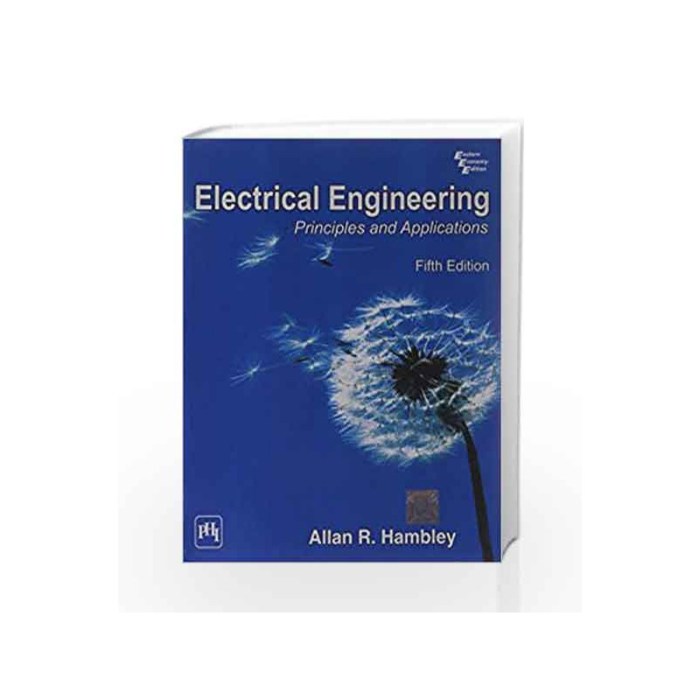Electrical Engineering Principles & Applications 7th Edition PDF provides a comprehensive overview of the fundamental principles of electrical engineering, offering a thorough understanding of the subject. This seminal work explores the core concepts of electricity, circuit analysis techniques, electrical machines, power systems, control systems, electrical safety, and emerging technologies in electrical engineering.
With its in-depth explanations, illustrative examples, and practical applications, this definitive guide empowers readers to delve into the intricacies of electrical engineering and its real-world applications.
Basic Concepts of Electrical Engineering
Electrical engineering is the branch of engineering that deals with the generation, transmission, and utilization of electricity. The fundamental principles of electricity include voltage, current, resistance, and power. These concepts are applied in electrical circuits, which are the pathways through which electricity flows.
Electrical components are the basic building blocks of electrical circuits. The most common electrical components include resistors, capacitors, and inductors. Resistors oppose the flow of current, capacitors store electrical energy, and inductors store magnetic energy.
Types of Electrical Components
- Resistors
- Capacitors
- Inductors
- Diodes
- Transistors
- Integrated circuits (ICs)
Circuit Analysis Techniques

Circuit analysis is the process of determining the voltage, current, and power in a circuit. The most common circuit analysis techniques include Ohm’s law, Kirchhoff’s laws, and nodal analysis.
Ohm’s law states that the voltage across a resistor is equal to the current through the resistor multiplied by the resistance of the resistor. Kirchhoff’s laws are two equations that describe the conservation of charge and energy in a circuit.
Steps for Solving Circuit Problems
- Draw a schematic diagram of the circuit.
- Apply Ohm’s law and Kirchhoff’s laws to the circuit.
- Solve the resulting equations for the unknown variables.
Electrical Machines
Electrical machines are devices that convert electrical energy into mechanical energy or vice versa. The most common electrical machines include transformers, motors, and generators.
Transformers change the voltage and current of an AC electrical signal. Motors convert electrical energy into mechanical energy. Generators convert mechanical energy into electrical energy.
Types of Electrical Machines
- Transformers
- Motors
- Generators
- Alternators
- Inverters
Power Systems: Electrical Engineering Principles & Applications 7th Edition Pdf
Power systems are the networks that generate, transmit, and distribute electricity. The components of a power system include generators, transmission lines, and distribution systems.
Generators produce electricity. Transmission lines carry electricity from generators to distribution systems. Distribution systems deliver electricity to homes and businesses.
Challenges and Opportunities in the Modern Power Grid
- The increasing demand for electricity
- The need to reduce greenhouse gas emissions
- The development of new renewable energy sources
Control Systems

Control systems are systems that use feedback to control the behavior of a system. Feedback is the process of measuring the output of a system and using that information to adjust the input.
Control systems are used in a wide variety of applications, including industrial automation, robotics, and aerospace.
Types of Control Systems, Electrical engineering principles & applications 7th edition pdf
- Open-loop control systems
- Closed-loop control systems
- Negative feedback control systems
- Positive feedback control systems
Electrical Safety
Electrical safety is the practice of protecting people and property from the hazards of electricity. The most common electrical hazards include electrical shock, electrical burns, and electrical fires.
Electrical safety regulations and standards are in place to help prevent electrical accidents. These regulations and standards cover a wide range of topics, including the installation, maintenance, and use of electrical equipment.
Tips for Working Safely with Electricity
- Never work on live electrical circuits.
- Always use insulated tools.
- Wear appropriate personal protective equipment (PPE).
- Be aware of the location of electrical hazards.
- Follow all electrical safety regulations and standards.
Emerging Technologies in Electrical Engineering
Electrical engineering is a rapidly changing field. The latest advancements in electrical engineering include renewable energy, smart grids, and electric vehicles.
Renewable energy sources, such as solar and wind power, are becoming increasingly popular. Smart grids are using technology to improve the efficiency and reliability of the power grid. Electric vehicles are becoming more affordable and efficient.
Examples of Emerging Technologies in Electrical Engineering
- Solar panels
- Wind turbines
- Smart meters
- Electric vehicles
- Wireless power transmission
FAQ Overview
What are the fundamental principles of electricity?
Electrical Engineering Principles & Applications 7th Edition PDF elucidates the fundamental principles of electricity, including voltage, current, resistance, and power, providing a solid foundation for understanding electrical circuits and their applications.
How does circuit analysis help in electrical engineering?
Circuit analysis techniques, such as Ohm’s law, Kirchhoff’s laws, and nodal analysis, are essential for analyzing electrical circuits, enabling engineers to determine circuit behavior, troubleshoot problems, and design efficient electrical systems.
What are the different types of electrical machines and their applications?
Electrical Engineering Principles & Applications 7th Edition PDF explores the principles of operation and applications of various electrical machines, including transformers, motors, and generators, providing insights into their crucial role in power generation, distribution, and utilization.
How does Electrical Engineering Principles & Applications 7th Edition PDF contribute to power systems engineering?
This comprehensive guide delves into the components and principles of power systems, encompassing generators, transmission lines, and distribution systems, empowering readers to understand power flow, stability, and the challenges and opportunities in modern power grids.
What are the emerging technologies shaping the future of electrical engineering?
Electrical Engineering Principles & Applications 7th Edition PDF examines the latest advancements in electrical engineering, including renewable energy, smart grids, and electric vehicles, highlighting their potential impact on society, the environment, and the future of electrical engineering.